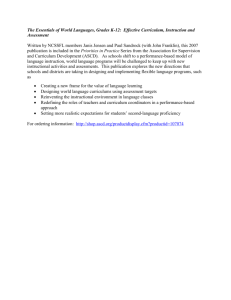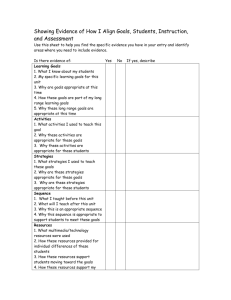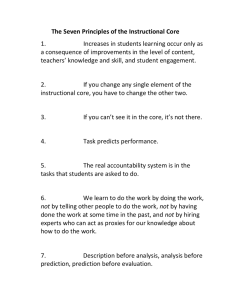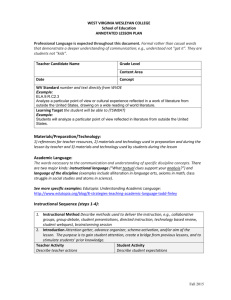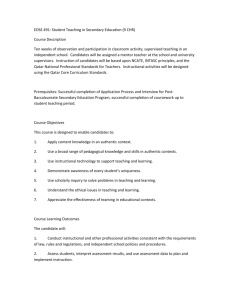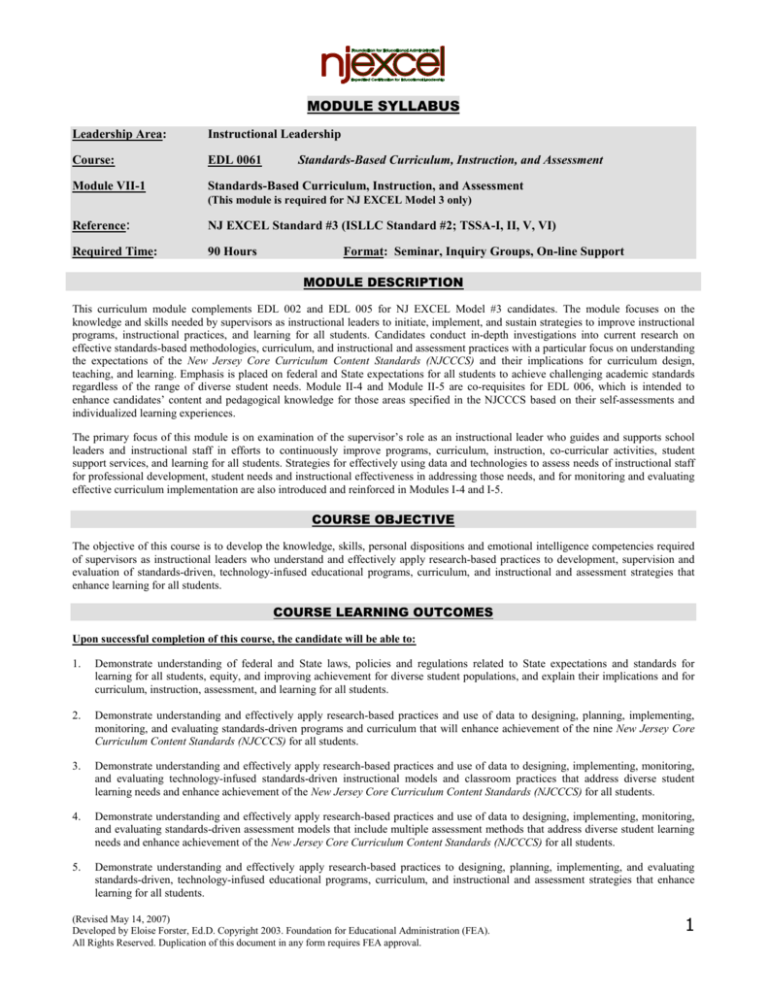
MODULE SYLLABUS
Leadership Area:
Instructional Leadership
Course:
EDL 0061
Module VII-1
Standards-Based Curriculum, Instruction, and Assessment
Standards-Based Curriculum, Instruction, and Assessment
(This module is required for NJ EXCEL Model 3 only)
Reference:
NJ EXCEL Standard #3 (ISLLC Standard #2; TSSA-I, II, V, VI)
Required Time:
90 Hours
Format: Seminar, Inquiry Groups, On-line Support
MODULE DESCRIPTION
This curriculum module complements EDL 002 and EDL 005 for NJ EXCEL Model #3 candidates. The module focuses on the
knowledge and skills needed by supervisors as instructional leaders to initiate, implement, and sustain strategies to improve instructional
programs, instructional practices, and learning for all students. Candidates conduct in-depth investigations into current research on
effective standards-based methodologies, curriculum, and instructional and assessment practices with a particular focus on understanding
the expectations of the New Jersey Core Curriculum Content Standards (NJCCCS) and their implications for curriculum design,
teaching, and learning. Emphasis is placed on federal and State expectations for all students to achieve challenging academic standards
regardless of the range of diverse student needs. Module II-4 and Module II-5 are co-requisites for EDL 006, which is intended to
enhance candidates’ content and pedagogical knowledge for those areas specified in the NJCCCS based on their self-assessments and
individualized learning experiences.
The primary focus of this module is on examination of the supervisor’s role as an instructional leader who guides and supports school
leaders and instructional staff in efforts to continuously improve programs, curriculum, instruction, co-curricular activities, student
support services, and learning for all students. Strategies for effectively using data and technologies to assess needs of instructional staff
for professional development, student needs and instructional effectiveness in addressing those needs, and for monitoring and evaluating
effective curriculum implementation are also introduced and reinforced in Modules I-4 and I-5.
COURSE OBJECTIVE
The objective of this course is to develop the knowledge, skills, personal dispositions and emotional intelligence competencies required
of supervisors as instructional leaders who understand and effectively apply research-based practices to development, supervision and
evaluation of standards-driven, technology-infused educational programs, curriculum, and instructional and assessment strategies that
enhance learning for all students.
COURSE LEARNING OUTCOMES
Upon successful completion of this course, the candidate will be able to:
1.
Demonstrate understanding of federal and State laws, policies and regulations related to State expectations and standards for
learning for all students, equity, and improving achievement for diverse student populations, and explain their implications and for
curriculum, instruction, assessment, and learning for all students.
2.
Demonstrate understanding and effectively apply research-based practices and use of data to designing, planning, implementing,
monitoring, and evaluating standards-driven programs and curriculum that will enhance achievement of the nine New Jersey Core
Curriculum Content Standards (NJCCCS) for all students.
3.
Demonstrate understanding and effectively apply research-based practices and use of data to designing, implementing, monitoring,
and evaluating technology-infused standards-driven instructional models and classroom practices that address diverse student
learning needs and enhance achievement of the New Jersey Core Curriculum Content Standards (NJCCCS) for all students.
4.
Demonstrate understanding and effectively apply research-based practices and use of data to designing, implementing, monitoring,
and evaluating standards-driven assessment models that include multiple assessment methods that address diverse student learning
needs and enhance achievement of the New Jersey Core Curriculum Content Standards (NJCCCS) for all students.
5.
Demonstrate understanding and effectively apply research-based practices to designing, planning, implementing, and evaluating
standards-driven, technology-infused educational programs, curriculum, and instructional and assessment strategies that enhance
learning for all students.
(Revised May 14, 2007)
Developed by Eloise Forster, Ed.D. Copyright 2003. Foundation for Educational Administration (FEA).
All Rights Reserved. Duplication of this document in any form requires FEA approval.
1
COURSE/MODULE PERFORMANCE INDICATORS
Course/module performance indicators are aligned with the NJ EXCEL Standards for School Leaders Framework and further delineate
expected learning outcomes specific to each course and module. The performance indicators are the basis for multiple candidate
performance-assessments by multiple assessors.
Knowledge & Understanding
Upon completion of this course/module, each candidate will demonstrate knowledge and understanding of key concepts through multiple
performance-based assessments. Minimally, candidates will be able to:
1. Explain the global issues and forces affecting teaching and learning.
2. Explain the role of the NJCCCS and standards-based curriculum, instructional, and assessment practices in the improvement of
teaching and learning for all students.
3. Explain student growth & development, the variety of ways in which students can learn, and developmentally appropriate
instruction.
4. Explain research-based principles of effective instruction to address diverse student learning needs
5. Describe research-based methods for curriculum design, implementation, evaluation, and adaptation for diverse student
populations.
6. Explain how to profile student performance and analyze possible differences among subgroups of students along relevant
characteristics to improve instructional practices & student learning (i.e. race, ethnicity, socio-economic status, gender).
7. Explain the role of current technologies in enriching learning environments, curriculum, instruction, & learning.
8. Describe research-based strategies for technology integration across the curriculum
9. Describe research-based strategies for use of technology to address diverse student learning needs.
10. Explain how to facilitate use of technologies to support & enhance instructional methods that develop higher-level thinking,
decision-making, and problem-solving skills.
11. Explain the use of data and research-based methods for assessing and improving learning for all students.
12. Identify federal and state laws related to equity and improving achievement for diverse student populations, and explain their
implications for curriculum, instruction, and learning for all students.
13. Identify and explain State policies and regulations related to State expectations and standards for learning for all students.
14. Explain how to use laws and the legal system to ensure equal access to high-quality programs and instruction for all students.
15. Describe how data and evaluation strategies can improve program and instructional effectiveness.
16. Explain how to organize & align school structures and time in innovative ways to improve schools and student learning
17. Explain how to develop student support programs & services to meet the diverse learning needs of students and their families.
Personal Dispositions
Throughout this course/module, each candidate will demonstrate enhanced self-awareness, self-understanding, and personal growth
related to personal beliefs, attitudes, and behaviors in the following areas:
1. Student learning as the fundamental purpose of schooling.
2. Preparing all students to be contributing members of society.
3. The use of technology to improve instruction & learning for all students.
4. Instructional leadership as the primary role of the school leader.
Emotional Intelligence Competencies
Upon completion of this module, each candidate will demonstrate enhanced self-understanding and emotional intelligence competencies
related to personal competence (how they manage themselves) and social competence (how they manage relationships) in the following
areas, as assessed by candidate pre/post self-assessments and multiple performance-based assessments:
1. Personal competence and self-awareness (emotional self-awareness, accurate self-assessment, self-confidence)
2. Personal competence and self-management (emotional self-control, transparency, adaptability, achievement, initiative,
optimism)
3. Social competence and social-awareness (empathy, organizational awareness, service)
4. Social competence and relationship-management (inspirational leadership, influence, developing others, change catalyst,
conflict management, building bonds, teamwork and collaboration)
Application of School Leadership Practices
Upon completion of this course/module, each candidate will demonstrate the ability to effectively apply his/her knowledge and
understanding of research-based school leadership practices. Minimally, candidates will demonstrate the ability to:
1. Effectively apply human development, learning & motivational theories, and strategies to address diverse learning needs to
provide multiple opportunities for all students for learning and assessment.
2. Base curriculum decisions on research, data related to student learning outcomes, teacher input, recommendations of
professional organizations, and the New Jersey Core Curriculum Content Standards.
3. Facilitate activities that apply research-based principles of effective instruction to improve curriculum, instructional and
assessment practices, and instructional materials for all students.
4. Creatively seek new resources to facilitate learning & use of technology for all students.
5. Assist teachers in using technology to collect, analyze & interpret student performance data, & in using results to appropriately
design, assess, & modify curriculum, and instructional and assessment practices to address diverse student learning needs.
(Revised May 14, 2007)
Developed by Eloise Forster, Ed.D. Copyright 2003. Foundation for Educational Administration (FEA).
All Rights Reserved. Duplication of this document in any form requires FEA approval.
2
MODULE SCHEDULE
(NOTE: Refer to Cohort Instructional Schedule for dates of sessions for specific topics)
Session
TOPICS OF STUDY
Readings/
Resources
Session
I
I. A New Vision for Instructional Leadership: Overview
A. Implementing standards-based reform
B. Accountability for learning of all students
C. Data-driven decision making
D. Research-based instructional practices
E. Collaboration as an essential strategy
F. Standards-based professional development
G. Empowering teachers as instructional leaders
H. Shaping curriculum and guiding instruction
II. Role of Instructional Leadership: Overview
A. Shaping the curriculum to address the NJCCCS
B. Developing vision & goals
C. Program evaluation
D. Guiding & supporting curriculum improvement as part of
the school improvement plan
E. Effecting curricular change
F. Prioritizing curriculum tasks
G. Supporting a learner-centered schedule
H. Integrating the curriculum
I. Aligning the curriculum with the NJCCCS
J. Monitoring & evaluating curriculum implementation
K. Using team leadership
L. Working with district & school leadership
M. Using research-based classroom management strategies
N. Developing specific curriculum improvement plans &
managing time
O. Using scientifically-based research to improve teaching
& learning
Session
II
III. Implications of state & federal mandates for instructional
programs, co-/extra-curricular activities, teaching, & learning
A. No Child Left Behind
B. NJCCCS
C. Graduation requirements
D. Affirmative Action
E. Core Team
F. Early Childhood Education
G. IDEA
H. 504/ADA Requirements
I. Pupil Personnel Services
J. Intervention and Referral Services
K. Bilingual/ESL
IV. Accepting the Challenge to Teach All Students
A. Understanding and educating students from low socioeconomic backgrounds
B. Understanding and educating culturally diverse students
C. Understanding and educating at-risk students
D. Understanding and educating the gifted
E. Helping teachers to accept the challenge
F. Serving as an advocate for diverse learners
G. Understanding and closing the achievement gap
V. Improving the Instructional Program for All Students
A. Using the NJCCCS and data to drive school,
programmatic, and instructional decisions
B. Planning to guide and improve the instructional program
for all students
Activities
Notes
NAESP 4-8
(Teaching Obs)
Reeves 1-149
NAESP (Data)
3-26, 49-65
Whitaker 3-116,
181-236
Zepeda 1-38
Keefe 1-34
Conzemius
1-35, 66-124,
App. A, B, C
Handouts:
Wiggins,
Togneri,
O’Connor,
Lipton
Stanovich
Togneri
(learningfirst.org)
Hurley
* See
Modules
I-1A & II-2
NAESP 3-38
(Sp Ed)
Reeves
NAESP 39-93
(Sp.Ed)
McEwan 1-200
NAESP 50-68
(Teacher Obs)
Case Studies:
Snowden # 1,
16, 30, 70
Zemelman
280-298
(Revised May 14, 2007)
Developed by Eloise Forster, Ed.D. Copyright 2003. Foundation for Educational Administration (FEA).
All Rights Reserved. Duplication of this document in any form requires FEA approval.
3
C.
D.
E.
F.
Session
III
Session
V
VI
Session
VII
Session
VIII
Effectively addressing diverse student needs
Aligning assessments with the NJCCCS
Assessing student learning using multiple methods
Working effectively with instructional staff to improve
programs, curriculum, instruction and student learning to
address the NJCCCS
VI. Addressing Diverse Student Needs
A. The role of expectations for student learning: examining
the research
B. Efforts-based vs. ability-based systems
C. Multicultural and inclusive classrooms
D. Differentiating instruction
E. Role of technology in addressing diverse student needs
F. Alternatives for use of time, scheduling, grouping, etc.
to address diverse student needs
VII. Examining Curriculum Theory and Applications
A. What is curriculum?
B. The progressive paradigm
C. The learner-centered curriculum
D. Society-centered curriculum
E. Knowledge-centered curriculum
VIII. Standards-Based Curriculum, Instruction and Assessment
A. Role of national & state standards for learning
B. Understanding the New Jersey Core Curriculum Content
Standards and their implications for curriculum,
instruction, & assessment
C. Understanding standards-based curriculum development
and implementation
D. Understanding standards-based instructional methods
E. Examining research-based practices
F. Enhancing teacher content knowledge for the NJCCCS
G. Analyzing current curriculum models (e.g. Accelerated
Reader, Guided Balanced Reading)
H. Aligning curriculum, content, learning objectives,
instruction, & assessment with the NJCCCS
I. Designing, implementing, & evaluating standards-based
instructional programs to address the NJCCCS
IX. Standards-Based Assessment of Student Learning
A. Understanding standards-based assessment methodologies
B. Ensuring authentic performance
C. Providing ongoing feedback
D. Promoting student understanding
E. Designing assessments
F. Standards and criteria
G. Individual performance tasks
H. Scoring rubrics
I. Applications and implications
J. Portfolio as evidence
K. Curriculum and instruction
L. Grading and reporting
M. Teaching and accountability
N. Changing the system
X. Meeting the Challenges of High Stakes Testing
A. High Stakes Testing: Complex Issues-No Easy Answers
B. Designing Effective Test Preparation Programs
C. Preparing Teachers for Testing
D. Test Day: Helping Students Do Their Best
E. Accommodations and Alternative Assessments for
Students with Special Needs
F. Using Assessment Data to Improve Instruction
G. Explaining Test Scores to Parents
H. The Role of the Principal
Hurley 1-87
USDOE Title III
NAESP 19-71
(Spec. Ed.)
Module
Activities
II-2-1
II-2-2
II-2-3
See Modules
for: II-2,
II-2-A
II-2-B
Module
Activity
VII-I-2
* See MiniModule II-2c
Ellis 1-146
NJCCCS
NJ Curriculum
Frameworks
Keefe 135-178
Handouts:
Brown 1-67
O’Connor 1-58
Ref: Assessment
Training Inst.
Drake 1-168
Zemelman 245279
Lorne
(Assessment)
Module
Activities
VII-I-3
II-4-1
Module
Activity
VII-I-1
NAESP 4-71
(High Stakes)
(Revised May 14, 2007)
Developed by Eloise Forster, Ed.D. Copyright 2003. Foundation for Educational Administration (FEA).
All Rights Reserved. Duplication of this document in any form requires FEA approval.
4
Session
IX
Session
X
Session
XI
Session
XII
Session
XIII
*
*
XI. The Constructivist Classroom
A. Honoring the learning process
B. Creating constructivist classrooms
XII. Examining Research-Based Instructional Strategies
A. Differentiated Instruction
1. Understanding differentiated instruction
2. Establishing conditions for differentiated
instruction
3. Staff development that supports differentiation
4. Communicating with parents about
differentiation
5. Planning for differentiation
B. Personalized Instruction
1. Elements of Personalized Instruction: Culture &
Context
2. Strategies and tactics for personalizing
instruction
3. Personalizing the Disciplines
4. Models of personalized instruction
XIV. Examining Best Practices Across the Content Areas
A. Visual & Performing Arts (Standard 1)
B. Comprehensive Health/Physical Education (Standard 2)
C. Language Arts/Literacy (Standard 3)
D. Mathematics (Standard 4)
E. Science (Standard 5)
F. Social Studies (Standard 6)
G. World Languages (Standard 7)
H. Technology Literacy (Standard 8)
I. Career education and Consumer, Family, and Life Skills
(Standard 9)
XV. Using Data to Improve Programs, Curriculum, Instruction
& Assessment
A. Program Evaluation
B. Collecting & analyzing data
C. Reporting & presenting data to improve programs,
curriculum, teaching, & assessment
XVI. Integrating technology in the school and curriculum to
enhance teaching and learning
A. Professional development: improving skills in use of
technology and data for instructional staff
B. The use of technology to address the NJCCCS
C. Integrating technology across the curriculum
D. Using technology in the student assessment process
E. The role of technology in project-based learning
F. The role of technology in the library/media center
G. Using technology in differentiated curriculum models to
address diverse student needs
H. Maximizing technology resources
XVII. Deepening Theoretical Knowledge to Improve Student
Learning
A. Human development theory and research
B. Student growth & development theory and research
C. Learning & motivational theories
D. Research-based principles of effective curriculum,
instruction, & assessment
E. Diverse student needs theory & research (i.e. cultural,
racial, language, economic)
F. Use of current technologies to enhance instruction
Brooks 3-127
Marzano
(Classroom)
1-160
Zemelman
1-182
Zemelman
183-216
NJCCCS
NJ Curriculum
Frameworks
Tomlinson
1-138
Zepeda
NAESP 3-69
(Prog. Eval)
Module
Activity
I-2-1
NAESP (Data)
XVIII. Deepening Knowledge of Content Fields
A. Current content knowledge
B. Role of content standards
C. Role of technology in content fields
(Revised May 14, 2007)
Developed by Eloise Forster, Ed.D. Copyright 2003. Foundation for Educational Administration (FEA).
All Rights Reserved. Duplication of this document in any form requires FEA approval.
Module
Activity
I-3-2
See Modules
I-2A and 2-B
*
Individualized
based on selfassessments
* See
Module II-6
Field-Based
Projects
Online
courses
Presentations
by peers
5
GUIDED INQUIRIES and MODULE ACTIVITIES
Problem-Based Activities
Candidates will regularly engage in individual and collaborative Problem-Based Activities, which include: analysis of case studies,
scenarios and vignettes; in-basket exercises related to written communications; document reviews related to legal and policy issues; and
simulations and role playing to more fully understand the problem from multiple perspectives and dynamics of the various constituencies
and test proposed solutions. The purpose of these activities is to enhance candidates’ critical thinking, problem-solving, decision-making,
and human relations skills in “real-life” situations that require the application of their theoretical and practical knowledge, leadership
skills, and appropriate personal dispositions to current educational issues and problems faced by school leaders as they function in their
complex roles on a daily basis.
Problem-Based Activities are organized around themes (e.g. student-related problems, school-parent relationships, school leader-staff
relationships). Instructors, mentors, and candidates are expected to follow the recommended critical analysis process for the specific type
of activity. Instructors will review the process/steps for each type of activity with the cohort and make all relevant information available
as required.
Problem-Based Activities are typically indicated in the Activity column of the Module Schedule in each syllabus and may be
added/substituted and used as deemed appropriate by the Instructor/E-Mentor. Candidates are encouraged to suggest problem-based
activities based on their personal experiences, which may be added/substituted at the discretion of the Instructor.
Guided Inquiry and Module Activities
Module Activities are designed as “guided inquiries” to enhance candidates’ knowledge, understanding, skills, and application of school
leadership practices, and reflective practice related to specific topics, concepts, and issues addressed in the Module Syllabi. These are
highly focused activities that are linked to readings, discussions, and authentic and performance-based experiences to reinforce and
extend learning, and to ensure consistency and continuity of experiences designed to result in the learning outcomes specified for each
module. Module Activities may be individual or collaborative and include activities such as, but not limited to: examination of district
and school leadership practices, reviews of the literature and research; reflective practice; data collection and analysis; interviews and
focus groups; development and presentation of strategies for change and improvement. Guided inquiries, problem-based and module
activities are integrated across class sessions, Inquiry Groups, and Internships. Some activities are also designed to stimulate
collaborative analysis and sharing using NJ EXCEL’s Online Learning Community (www.njexcel.org).
NOTE: Candidates are required to record responses to guided inquiries, problem-based and module activities in “Activities and
Reflection Logs” that are designed to include activities for all modules and each Internship experience. The templates for these Logs
should be downloaded from www.njexcel.org Documents Section 3D.
GUIDED INQUIRIES and MODULE ACTIVITIES: MODULE VII-1
NOTE: Candidates are required to record responses to the following module activities in the Instructional Module Activities and
Reflection Log, which should be downloaded from www.njexcel.org Documents Section 3D.
Module Activity VII-1-1
Examining Curriculum Practices
Examine the approved curriculum in your district for a range of grade levels (i.e. P-4, 5-8, 9-12), and any relevant district policies and
practices that support effective curriculum development and implementation. Be prepared to discuss your analysis in class.
Guiding Questions: (a) Do the policies and practices ensure routine curriculum evaluation and review that effectively leads to timely and
appropriate revisions? (b) What is the process for curriculum development, and who is involved? (c) Is the curriculum aligned with
research-based instructional and assessment methodologies (i.e. interdisciplinary approaches, authentic assessment)? (d) Is the curriculum
standards-driven and clearly aligned with the NJCCCS? (e) Is the curriculum aligned with the district vision, stated values and beliefs, and
educational goals? (f) What policies exist and who is responsible for monitoring implementation and evaluation of the approved
curriculum? (g) Does the curriculum serve as a blueprint for consistent delivery of effective instructional practices across all schools,
classrooms and grade levels? Does the curriculum provide sufficient guidelines for teachers and others related to recommended and
required content, instructional and assessment strategies, and outcomes expected for all students, including accommodating diverse
learning needs? (h) How well is the approved curriculum articulated across grade levels and content areas? What mechanisms are in place
in your district/school to ensure articulation in curriculum implementation: across grades and content areas; across classrooms within the
same grade; across grade level transitions between your school and other schools? (i) Does the curriculum include standards-based
assessments to determine student achievement of specific learning outcomes? (j) Does the curriculum effectively integrate use of current
technologies to enhance instruction and student learning? (k) Does the curriculum provide for and support accommodations for diverse
needs of all student learners? (l) Is your school organized (staff, time, space, other resources) to effectively implement the curriculum so
all students have maximum opportunity to learn? If not, how will you address this? (m) How would you improve your district’s approved
curriculum and process for its development, implementation, and evaluation?
(Revised May 14, 2007)
Developed by Eloise Forster, Ed.D. Copyright 2003. Foundation for Educational Administration (FEA).
All Rights Reserved. Duplication of this document in any form requires FEA approval.
6
Module Activity VII-1-2
Examining Instructional Practices
Examine instructional practices in your school and any relevant district policies and practices that support effective instructional practices
and learning for all students. Be prepared to discuss your analysis in class.
Guiding Questions: (a) Do district policies and practices support effective instructional practice and learning for all students? (b) Are
teachers well prepared to effectively implement research-based instructional practices in their classrooms? What practices support
teachers, their continuing professional growth, and continuous improvement of their performance and application of effective
instructional practices? (c) Are instructional practices aligned with research-based instructional and assessment methodologies? (d) Are
instructional practices standards-driven and clearly aligned with the NJCCCS? (e) Are instructional practices aligned with the district
vision, stated values and beliefs, and educational goals? (f) Who is responsible for supervising and evaluating teacher performance and
instructional effectiveness? Do supervision and evaluation practices improve teacher performance and instructional practices? (g) Is there
consistent delivery of effective instructional practices across all classrooms and grade levels? (h) Do instructional practices include
effective use of standards-based assessments to determine student achievement of specific learning outcomes? (i) Do instructional
practices routinely and effectively integrate use of current technologies to enhance instruction and student learning? (j) Do instructional
practices routinely provide for and support accommodations for diverse needs of student learners? (k) How would you improve teacher
performance and instructional practices in your school/district?
CANDIDATE ASSESSMENT OF LEARNING OUTCOMES
All candidate assessments are performance-based and aligned with the NJ EXCEL Standards for School Leaders Framework and the NJ
EXCEL Candidate Performance Assessment Rubric and Criteria. Multiple methods are used by faculty to assess learning outcomes in a
multi-level candidate assessment system that includes evidence collected both formally and informally, including but not limited to:
observations; work samples; reflections; demonstrations; essays; problem-solving activities; peer reviews; presentations; action research
projects; school-based projects; planning documents; field-based assessments; analyses of case studies, documents reviews; internal and
external portfolio reviews; and standardized State test results.
Informal Candidate Assessment is ongoing and includes:
Faculty observation of, and interactions with, candidates related to module activities;
Ongoing communications and interactions between mentors and other faculty with candidates related to their projects, portfolio
artifacts, and other activities;
Candidates’ commentaries in electronic communications using the NJ EXCEL Online Learning Community.
Formal Candidate Assessment is ongoing and includes:
NJ EXCEL Candidate Performance Assessment Rubric and Criteria: focused on candidates’ demonstration of personal
dispositions and emotional intelligence competencies, and their ability to apply their knowledge and skills to effective
leadership practice (Written assessment checklist by multiple mentors using rubrics)
Technology Project: for candidates with Intermediate/advanced technology proficiency who do not require basic technology
skills training (Written assessment by NJ EXCEL Technology Coordinator)
Job-Embedded Project: focused on a specific professional growth target(s) (Written assessment report by E-Mentor using
rubric).
Action Research Project: focused on organizational change and improvement to enhance learning for all students (Written
assessment report by E-Mentor using rubric).
Action Research Presentation: candidates prepare a PowerPoint of their action research for presentation to their Inquiry Group
peers and E-Mentor at the end of the program (Written assessment report by E-Mentor; peers provide feedback only).
School-Based Internship Assessment: focuses on I-Mentors’ observations of, and interactions with, candidates during the
Internship. (Written assessment report by I-Mentor).
School-Based Internship Project: focused on a specific professional growth target(s) at the Internship site (Written assessment
report by Internship Mentor using rubric).
Supervisory Internship Assessment (30 hours--Model #3 Only): focuses on Supervisory Mentors’ (S-Mentors) observations of,
and interactions with, candidates during their Supervisory Internship (Written assessment report by S-Mentor).
Supervisory Project Assessment (60 hours—Models #2 and #3 Only): focuses on Supervisory Mentors’ (S-Mentors)
observations of, and interactions with, candidates during the planning and development of their Supervisory Project, and
assessment of the project using rubrics (Written assessment report by S-Mentor).
Candidate Summative Assessment Conference: E-Mentor conducts individual conference with each candidate following the
last Inquiry Group meeting to review program completion status, project assessments, draft of E-mentor Summative
Assessment Report, and Leadership e-folio to approve for External Portfolio Review presentation. (Draft assessment report and
EPR approval)
E-Mentor Summative Assessment Report: focuses on E-Mentors’ assessment of candidates’ overall performance related to
Inquiry Group activities, projects, and module activities as measured by performance standards (Written assessment report by
E-Mentor).
Field-Based Observation Assessment: focuses on shadowing and observation of the candidates “in action” in a job-embedded
activity(ies) on-site in the candidate’s district/school (Written assessment report by Field Supervisor).
(Revised May 14, 2007)
Developed by Eloise Forster, Ed.D. Copyright 2003. Foundation for Educational Administration (FEA).
All Rights Reserved. Duplication of this document in any form requires FEA approval.
7
Leadership Portfolio: Regular conferences and quarterly working portfolio reviews between E-Mentors and candidates to
assess progress throughout the program.
External Portfolio Review: At the end of the program, each candidate develops his/her working portfolio as a presentation
“Leadership e-folio” (electronic portfolio) for an External Portfolio Review (EPR) where the e-folio is assessed by a panel of
principals and faculty using the “Leadership e-folio Presentation Rubric”, which is based on the seven NJ EXCEL School
Leader Standards.
Candidates’ Pre/Post Self-Assessments: provide data related to candidates’ perceptions of their professional growth from the
beginning to the end of the program, as measured by the seven NJ EXCEL School Leader Standards.
School Leader Licensure Assessment (SLLA): State-required test for principal certification (Passing score required for
program completion).
Formative assessment of module activities and informal observations of faculty focus on providing continual feedback to the candidates
to inform and guide their professional growth planning. The E-Mentor has primary responsibility for comprehensive assessment
(formative and summative) with input from other faculty, as appropriate. The following assessments weigh most heavily (total 75%) in
the Summative Assessment of the candidate’s professional growth and demonstration of his/her knowledge and understanding, skills,
personal dispositions and emotional intelligence competencies, and his/her ability to effectively apply them to school leadership practice:
A “Proficient” rating for each of the required projects (Action Research, Job-Embedded, School-Based Internship,
Supervisory);
A “Proficient” rating for presentation of the Action Research Project;
School-Based Internship Assessment;
Supervisory Internship Assessment (Model 3 only);
Field-Based Observation Assessment;
E-Mentor Summative Assessment;
Evidence presented by the candidate in his/her Leadership e-folio and assessed by an External Review Panel.
REQUIRED READING
Assessment Training Institute. (November 2002). Leadership for Excellence in Assessment—2003: A Planning Guide to the Perfect
Assessment System. Portland, OR: Assessment Training Institute. (www.ati@assessmentinst.com)
Brooks, Jacqueline and M. Brooks. (1999). In Search of Understanding: The Case for Constructivist Classrooms. Alexandria, VA:
ASCD.
Brophy, Jere. Teaching. Brussels, Belgium: International Academy of Education. (www.ibe.unesco.org and www.temple.edu/LSS ).
[HANDOUT]
Brown, John L. (2003). Guide for Instructional Leaders: Leading Classroom Assessment. Alexandria, VA: ASCD. [HANDOUT]
Conzemius, Anne and T. O’Neill (2001). Building Shared Responsibility for Student Learning. Alexandria, VA: ASCD.
Drake, Susan and R. Burns. (2004). Meeting Standards Through Integrated Curriculum. Alexandria, VA: ASCD.
Educational Research Service. NAESP Essentials for Principals Series. Alexandria, VA: NAESP.
Effective Program Evaluation
School Leader’s Guide to Special Education
Effective Teacher Observations
Meeting the Challenges of High Stakes Testing
Data-Based Decision-Making
Earl, Lorna. (2003). Assessment as Learning: Using Classroom Assessment to Maximize Learning. Thousand Oaks, CA: Corwin Press.
(ISBN 0-7619-4626-8)
Ellis, Arthur. (2004). Exemplars of Curriculum Theory. Larchmont, NY: Eye on Education.
Hurley, Judith. (2003). Meeting the Needs of Second Language Learners. Alexandria, VA: ASCD.
Langer, Georgea, et.al. (2003). Collaborative Analysis of Student Work: Improving Teaching and Learning. Alexandria, VA: ASCD.
Lipton, Laura and B. Wellman. (2002). Guide for Instructional Leaders: Learning Focused Instructional Leadership. Alexandria, VA:
ASCD. [HANDOUT]
Marzano, Robert (2002). What Works in Schools: Translating Research Into Action. Alexandria, VA: ASCD
Marzano, Robert, et. al. (2001). Classroom Instruction that Works: Research-Based Strategies for Increasing Student Achievement.
Alexandria, VA: ASCD.
(Revised May 14, 2007)
Developed by Eloise Forster, Ed.D. Copyright 2003. Foundation for Educational Administration (FEA).
All Rights Reserved. Duplication of this document in any form requires FEA approval.
8
McEwan, Elaine. (2002). 10 Traits of Highly Effective Teachers. Thousand Oaks, CA: Corwin Press.
New Jersey Department of Education. (April 2004). New Jersey Core Curriculum Content Standards.
New Jersey Department of Education. New Jersey Curriculum Frameworks.
O’Connor, Ken. (2003). Guide for Instructional Leaders: Leading Grading and Reporting for Student Learning. Alexandria, VA: ASCD.
[HANDOUT]
Reeves, Douglas. (2004). Accountability for Learning: How Teachers and School Leaders Can Take Charge. Alexandria, VA: ASCD.
Stanovich, Paula and K. Stanovich. (May 2003). Using Research and Reason in Education: How Teachers Can Use Scientifically-Based
Research to Make Curricular and Instructional Decisions. Portsmouth, NH: RMC Research Corporation. [HANDOUT]
Togneri, Wendi and S. Anderson. (2003). Beyond Excellence: What Districts Can Do to Improve Instruction and Achievement in All
Schools. Learning First Alliance. (www.learningfirst.org)
Tomlinson, Carol Ann and S. Allan. (2000). Leadership for Differentiating Schools and Classrooms. Alexandria, VA: ASCD.
USDOE Bilingual Education Materials (2002). No Child Left Behind Act of 2001. Title III: Language Instruction for Limited English
Proficient and Immigrant Students (January 2002).
Whitaker, Todd, et.al. (2000). Motivating and Inspiring Teachers: The Educational Leader’s Guide for Building Staff Morale.
Larchmont, NY: Eye on Education.
Wiggins, Grant. (2003). Guide for Instructional Leaders: Leading Curriculum Development. Alexandria, VA:ASCD. [HANDOUT]
Zemelman, Steven, et.al. (1998). Best Practice: New Standards for Teaching and Learning in America’s Schools. Portsmouth, NH:
Heinemann.
Zepeda, Sally and R.S. Mayers. (2004). Supervision Across the Content Areas. Larchmont, NY: Eye on Education.
RECOMMENDED READING
Blasé, Jo and J. Blasé. (1998). Handbook of Instructional Leadership: How Really Good Principals Promote Teaching and Learning.
Thousand Oaks, CA: Corwin Press, Inc. (ISBN 0-0839-6554-0)
Boulmetis, John & P. Dutwin (2000). The ABC’s of Evaluation: Timeless Techniques for Program & Project Managers. San Francisco,
CA: Jossey-Bass (ISBN 0-7879-4432-7).
Glickman, Carl D, (2002). Leadership for Learning. Alexandria, VA: ASCD. (ISBN 0-87120-596-3)
Hostetler, Karl (1997). Ethical Judgment in Teaching. Boston: Allyn & Bacon (ISBN 0-205-17408-6)
Jason, Martin (2003). Evaluating Programs to Increase Student Achievement. Glenview, IL: Skylight Professional Development.
(ISBN 1-57517-815-X)
Mark, Melvin, et.al. (2000). Evaluation: An Integrated Framework for Understanding, Guiding & Improving Policies and Progress. San
Francisco, CA: Jossey-Bass (ISBN 0-7879-4802-0)
Marzano, Robert. (2003). Classroom Management that Works: Research-Based Strategies for Every Teacher. Alexandria, VA: ASCD.
November, Alan (2001). Empowering Students with Technology. Arlington Heights, IL: Skylight Professional Development.
(ISBN 1-57517-372-7)
Tileston, Donna. (2004). What Every Teacher Should Know About Series. Thousand Oaks, CA: Corwin Press.
Effective Teaching Strategies
The Profession and Politics of Teaching
Instructional Planning
Media and Technology
Learning, Memory and the Brain
Special Learners
Student Motivation
Student Assessment
Diverse Learners
Classroom Management and Discipline
(Revised May 14, 2007)
Developed by Eloise Forster, Ed.D. Copyright 2003. Foundation for Educational Administration (FEA).
All Rights Reserved. Duplication of this document in any form requires FEA approval.
9
Wiggins, Grant. (1998). Educative Assessment: Designing Assessments to Inform and Improve Student Performance. San Francisco,
CA: Jossey-Bass Publishers.
RECOMMENDED RESOURCES
Videotapes
At Work in the Differentiated Classroom (Set of 3). (2001. Alexandria, VA: ASCD.
Teaching for Learner Success
Planning for Curriculum and Instruction
Managing the Classroom
Center for Applied Linguistics. (2002). Helping English Learners Succeed: An Overview of the SIOP Model.
DuFour, Rebecca. (2003). Elementary Principals As Leaders of Learning (Set of 3). Video Journal.
Leading Learning
Effective Leadership
Facilitating School Improvement
Jones, Irving. (2003). Secondary Principals As Leaders of Learning (Set of 3). Video Journal.
Leading Learning
Effective Leadership
Building a Culture of Learning
DuFour, Richard. (2002). How to Develop a Professional Learning Community: Passion and Persistence. National Education Service.
DuFour, Richard. (1999). Professional Learning Communities at Work: Best Practices for Enhancing Student Achievement (Set of 3).
National Education Service.
Mission, Vision, Values and Goals
Collaborative teams Engaged in Collective Inquiry
Changing Your School’s Culture
DuFour, Richard. (2001). Leadership in the Age of Standards and High Stakes (Set of 2). Teachstream, Inc.
Creating a Professional Learning Community
Bringing Students to Higher Levels of Success
Examining Student Work: Collaborative Analysis of Student Learning (Set of 4). (2002). Alexandria, VA: ASCD.
Improving Student Learning
The Tuning Protocol
Standards in Practice
Collaborative Analysis of Student Learning
Improving Instruction Though Observation and Feedback (Set of 3). 2002). Alexandria, VA: ASCD.
Different Models of Providing Classroom-based Assistance
Observation techniques
Approaches to Working Closely with Teachers
Marzano, Robert. (2003). What Works in Schools (Set of 3). Alexandria, VA: ASCD.
School Factors, Teacher Factors, Student Factors
McGuire, Marilyn. (2002). Evaluation to Promote Teacher Growth and Student Learning (Set of 2). Teachstream.
Teaching Students with Learning Disabilities in the Regular Classroom (Set of 2). (2002). Alexandria, VA: ASCD.
Using Learning Strategies
Adjusting for Learner Needs
Whitaker, Todd. (2004). Dealing with Teachers Who Are Resistant to Change and reluctant to Improve (Set of 2). Video Journal.
Understanding the Dynamics of Different Types of Teachers
Effective Ways to Solve Little Problems
Please refer to NJ EXCEL’s Online Learning Community
(www.njexcel.org “Documents Section 3”)
(Revised May 14, 2007)
Developed by Eloise Forster, Ed.D. Copyright 2003. Foundation for Educational Administration (FEA).
All Rights Reserved. Duplication of this document in any form requires FEA approval.
10
(Revised May 14, 2007)
Developed by Eloise Forster, Ed.D. Copyright 2003. Foundation for Educational Administration (FEA).
All Rights Reserved. Duplication of this document in any form requires FEA approval.
11


